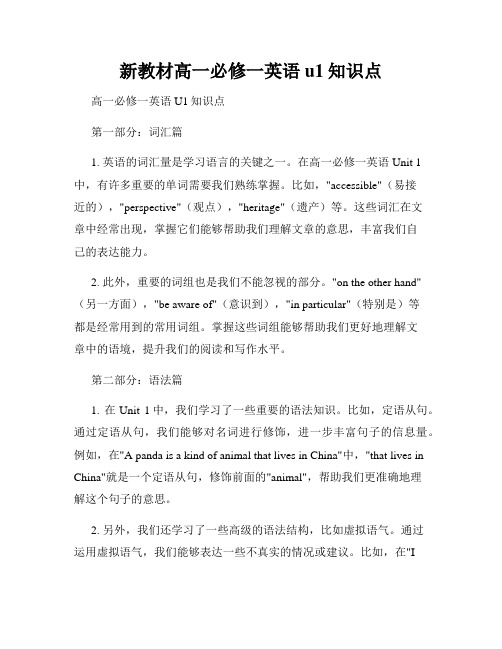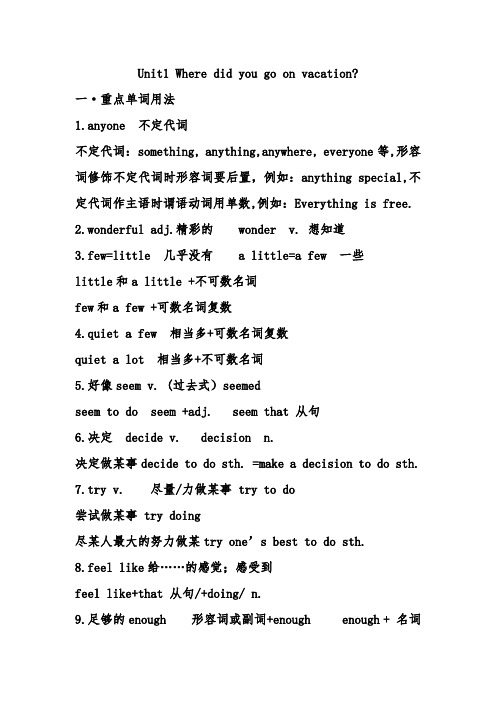U1知识点
U1单词音标-知识点

1.[hi:l] 2.[sku:p] 3.*ɪˌlekˈtrɪsəti+ 4.*staɪl+ 5.*ˈpleʒə(r)+ 6.*ˈzɪpə(r)+ 7.*ˈdeɪli+ 8.有道理 9.*ˈwebsaɪt+ 10.*ˌpaɪəˈnɪə(r)+ 11.*lɪst+ 12.*ˈmenʃn+ 13.*ˌæksɪˈdentl+ 14.偶然
• • • •
• • • • • •
10、有计划的发生;take place 偶然的发生 happen(sth. Happen to sb.) 自从1978年,巨大的改变已经发生 Great changes have taken place since 1978. 昨天晚上他发生了一个意外。 An accident happened to him last night. 11、毫无疑问 without doubt 12、以一个很高的/很低的价格at a high /low price ----对价钱提问:(2种) How much---, What’s the price of....? 现在房子的价格很高。 The price of the houses is now. 现在房子很贵 The houses are now.
42.['kʌstəmə] 43.['kʌstəm] 44.[əu'limpik] 45.奥林匹克运动会 46.[kə'neɪdɪən] 47.[dɪ'vaɪd] 48.把…分开 49.['bɑːskɪt] 50.不但…而且… 51.钦佩;仰慕 52.['hɪərəʊ] 53.[prə'feʃ(ə)n(ə)l] 54.['nɪəlɪ]
七年级上册u1u2重要知识点

七年级上册u1u2重要知识点七年级是初中学习的开端,U1U2章节是教育教学中的基础重点,为了让同学们能够更好地学习和掌握,今天我们就来说一下U1U2章节的重要知识点。
一、Unit 1 School Life1. 学校日常用语:如Good morning/afternoon,How are you?等。
2. 介绍自己和朋友的基本表达:如My name is…,I’m from…,He/She is my friend等。
3. 学科名称和老师的称呼:如English,Chinese,Math,Science,Mr./Ms./Mrs. +姓氏等。
4. 学校设施和活动:如classroom,library,PE class,schooltrip等。
5. 学习习惯的养成:如homework,study,review等。
6. 美国学校和中国学校的一些区别和相似之处。
二、Unit 2 Family and Friends1. 家庭成员称呼:如father,mother,brother,sister,grandpa,grandma等。
2. 家人的外貌特征和个性特点的简单描述:如short,long hair,friendly,funny等。
3. 家庭成员的职业:如doctor,teacher,engineer等。
4. 朋友的基本描述:如smart,kind,funny,like to read等。
5. 爱好和兴趣的表述:如play sports,listen to music,watch movies等。
6. 趣味性的对话,如问候语,介绍自己和朋友等。
以上就是U1U2知识点的相关内容,同学们可以根据这些内容更好地学习和掌握课程的难点,希望大家在学习的道路上越来越顺利。
八年级上册英语u1语法知识点

八年级上册英语u1语法知识点英语语法对于学习英语而言是非常重要的一部分,尤其是对于初中学生来说,掌握语法知识点是很有必要的。
本文将重点介绍八年级上册英语U1中的一些常用语法知识点,帮助大家更好地学习英语。
一、动词时态动词时态是英语语法中最基本也是最常用的部分,对于初学者来说掌握好动词时态是至关重要的。
在U1中,出现了以下几种时态:一般现在时、一般过去时、现在进行时。
这里我们分别来介绍一下。
1. 一般现在时一般现在时表示的是现在的状态或习惯动作,通常使用“主语+谓语动词的原形”构成,如:- I play basketball with my friends after school.(我放学后和我的朋友们打篮球。
)- She usually goes to school by bus.(她通常乘公交车去上学。
)2. 一般过去时一般过去时表示过去的状态或动作,通常使用“主语+谓语动词的过去式”构成,如:- Yesterday, I went to the park with my family.(昨天,我和我的家人去了公园。
)- He studied hard for the exam last night.(他昨晚为考试努力学习。
)3. 现在进行时现在进行时表示现在正在进行的动作,通常使用“主语+be动词+现在分词”构成,如:- They are playing basketball on the playground.(他们正在操场上打篮球。
)- I am studying for the English test now.(我正在准备英语考试。
)二、情态动词情态动词在英语语法中也是比较重要的一部分,它是用来表示说话者对某一行为的态度、意愿或可能性的动词。
在U1中,主要涉及到以下几个情态动词:can、could、may、might、must、should、would。
这里我们分别来介绍一下。
1. can和couldcan和could都表示能力和可能性。
新教材高一必修一英语u1知识点

新教材高一必修一英语u1知识点高一必修一英语U1知识点第一部分:词汇篇1. 英语的词汇量是学习语言的关键之一。
在高一必修一英语Unit 1中,有许多重要的单词需要我们熟练掌握。
比如,"accessible"(易接近的),"perspective"(观点),"heritage"(遗产)等。
这些词汇在文章中经常出现,掌握它们能够帮助我们理解文章的意思,丰富我们自己的表达能力。
2. 此外,重要的词组也是我们不能忽视的部分。
"on the other hand"(另一方面),"be aware of"(意识到),"in particular"(特别是)等都是经常用到的常用词组。
掌握这些词组能够帮助我们更好地理解文章中的语境,提升我们的阅读和写作水平。
第二部分:语法篇1. 在Unit 1中,我们学习了一些重要的语法知识。
比如,定语从句。
通过定语从句,我们能够对名词进行修饰,进一步丰富句子的信息量。
例如,在"A panda is a kind of animal that lives in China"中,"that lives in China"就是一个定语从句,修饰前面的"animal",帮助我们更准确地理解这个句子的意思。
2. 另外,我们还学习了一些高级的语法结构,比如虚拟语气。
通过运用虚拟语气,我们能够表达一些不真实的情况或建议。
比如,在"Iwish I were a bird"中,使用了虚拟语气来表达自己希望成为鸟的愿望,但事实上并不是真实的情况。
第三部分:阅读篇1. 在Unit 1的阅读部分,我们阅读了一篇名为"Great writers"的文章。
通过阅读该文章,我们能够了解一些伟大作家的生平及其对世界文学的影响。
八上英语U1知识点

八上英语U1知识点Unit 1一、单词及短语1. school n. 学校2. bus n. 公共汽车3. stop n. 站4. library n. 图书馆5. cinema n. 电影院6. hospital n. 医院7. park n. 公园8. post office n. 邮局9. supermarket n. 超市10. bookshop n. 书店11. station n. 车站12. believe v. 相信13. understand v. 理解14. over there adv. 那边15. city n. 城市16. near prep. 靠近17. take v. 乘坐18. turn v. 向右转弯19. left adj. 左边的20. right adj. 右边的21. straight adv. 向前走22. get off phr. 下车二、重点句子及短语1. Where is the post office? 邮局在哪里?2. It's near the hospital. 它离医院很近。
3. Take the No.3 bus and get off at the third stop. 乘坐3路公共汽车,在第三站下车。
4. Turn left at the crossing. 在十字路口左转。
5. Go straight and it's on your right. 向前走,它在你的右边。
6. I don't understand. 我不理解。
7. Go over there. 去那边。
(完整版)八年级上册U1知识点

Unit1 Where did you go on vacation?一·重点单词用法1.anyone 不定代词不定代词:something, anything,anywhere, everyone等,形容词修饰不定代词时形容词要后置,例如:anything special,不定代词作主语时谓语动词用单数,例如:Everything is free.2.wonderful adj.精彩的 wonder v. 想知道3.few=little 几乎没有 a little=a few 一些little和a little +不可数名词few和a few +可数名词复数4.quiet a few 相当多+可数名词复数quiet a lot 相当多+不可数名词5.好像seem v. (过去式)seemedseem to do seem +adj. seem that 从句6.决定 decide v. decision n.决定做某事decide to do sth. =make a decision to do sth.7.try v. 尽量/力做某事 try to do尝试做某事 try doing尽某人最大的努力做某try one’s best to do sth.8.feel like给……的感觉;感受到feel like+that 从句/+doing/ n.9.足够的enough 形容词或副词+enough enough + 名词10.不喜欢 dislike v. 同义词:hate 反义词:like/love不喜欢做某事 dislike doing sth.二.课文中的重点1.做某事很有乐趣have fun (doing sth.) = have a good time( doing sth.)=enjoy oneself (doing sth.)他们每天打排球很有乐趣。
They have fun playing basketball every day.=They have a good time playing basketball every day.=They enjoy themselves playing basketball every day. 2.到达。
新高一英语必修一U1知识点

新高一英语必修一U1知识点Unit 1: Friendship - Key PointsIntroduction:As students enter their 11th grade, they will embark on a new journey of learning in English language and literature. In this unit, we will explore the theme of friendship, which plays a significant role in our lives. By focusing on the key points of this unit, students will deepen their understanding of friendship, develop their English language skills, and enhance their analytical and critical thinking abilities.1. The Importance of Friendship:Friendship is an essential aspect of human existence. It brings joy, support, and companionship, enabling individuals to share experiences, seek advice, and find emotional solace. Friends serve as pillars in times of need and add meaning to our lives. Through literature and various texts in this unit, students will examine the significance of friendship in different cultural, historical, and personal contexts.2. Vocabulary and Grammar:Acquiring a strong vocabulary and understanding grammar rules are essential for effective communication. Throughout this unit, students will encounter a variety of vocabulary related to friendship and relationships. They will learn how to properly use adjectives to describe qualities of friendship and comparative and superlative forms to express their preferences. Additionally, students will practice the use of present simple, present continuous, and past simple tenses to describe events, actions, and experiences related to friendship.3. Reading Comprehension:Developing strong reading skills is crucial for comprehending texts and extracting relevant information. In this unit, students will read a range of texts, including poems, short stories, and articles, all centered around the theme of friendship. They will learn effective reading strategies, such as scanning for specific details, skimming for main ideas, and making inferences to enhance their comprehension abilities.4. Writing Skills:Written communication is a fundamental skill for expressing ideas and emotions. In this unit, students will practice different types of writing related to friendship, including personal narratives, persuasive essays, and descriptive pieces. They will focus on organizing theirideas coherently, using appropriate vocabulary and grammar, and developing a clear and engaging writing style.5. Speaking and Listening:Oral communication is vital for expressing thoughts, engaging in discussions, and actively participating in social interactions. Through various activities, such as group discussions, role-plays, and presentations, students will enhance their speaking and listening skills. They will learn to express their opinions, actively listen to others, and engage in respectful and meaningful conversations related to friendship.Conclusion:By focusing on the key points discussed in this unit, students will gain a deeper understanding of friendship, improve their vocabulary and grammar skills, enhance their reading comprehension abilities, develop their writing skills, and strengthen their oral communication capabilities. The exploration of friendship in different contexts will encourage students to reflect on their own experiences and cultivate meaningful relationships with others.。
unit1知识点

unit1知识点
以下是Unit 1的知识点:
1. 问候和自我介绍:
- 问候的常用表达:Hello, hi, good morning/afternoon/evening, how are you?
- 自我介绍的常用句型:My name is xxx. I am xx years old. I come from xxx.
2. 介绍家庭成员:
- 家庭成员的称呼:father, mother, brother, sister, grandparents, etc.
- 介绍家庭成员的常用句型:This is my father/mother/brother/sister. His/Her name is xxx.
3. 询问和回答个人信息:
- 询问名字:What's your name?/What's your full name?
- 询问年龄:How old are you?
- 询问国籍:Where are you from?
- 回答个人信息的常用句型:My name is xxx. I am xx years old. I come from xxx.
4. 简单的日常用语:
- 感谢:Thank you. Thanks a lot.
- 道歉:I'm sorry. I apologize.
- 请问:Excuse me, can I ask you a question?
5. 时态:
- 一般现在时:表述经常发生的事情、事实和真理。
- 现在进行时:表示现在正在进行或发生的动作。
这些是Unit 1的主要知识点,希望对你有帮助!。
- 1、下载文档前请自行甄别文档内容的完整性,平台不提供额外的编辑、内容补充、找答案等附加服务。
- 2、"仅部分预览"的文档,不可在线预览部分如存在完整性等问题,可反馈申请退款(可完整预览的文档不适用该条件!)。
- 3、如文档侵犯您的权益,请联系客服反馈,我们会尽快为您处理(人工客服工作时间:9:00-18:30)。
U1 知识重点
单词
illness n. 病express v. 表达;表露pain n. 痛苦
lonely adj. 孤独的friendship n. 友谊difficulty n. 困难peace n. 平静hurt v. 受伤(hurt; hurt) courage n. 勇气spirit n. 情绪;精神pay v. 付费(paid; paid) community n. 社区
短语
in need 需要协助的voluntary work 义务性工作ask permission 报请批准give sb. a hand 协助某人disable people 伤残者raise money 筹集善款
old people’s home 敬老院suffer from 因…受苦raise one’s spirits 使振奋be in high spirits 情绪高涨in order to 为了attend school 上学
use sth. for doing sth. 用某物做某事aged from…to…年龄从…岁到…岁continue to do sth. 继续做某事have difficulty doing sth. 做某事有困难in good/ bad health 身体状况良好/较差be unable to do sth. 无法做某事
the very first 第一个
重点句
1.Three teenagers offered to do some voluntary work during the school holidays.
三位青少年主动提出在学校放假期间做义工。
2.I went there and took some photos of it.
我去了那里,拍了几张照片。
3.This helps them express their feelings.
这有助于他们表达自己。
4.We spent time with a girl called Vivien.
我们陪伴了一个名叫Vivien的女孩。
5.My mother and I will continue to visit Vivien.
我和我的母亲会继续去看望Vivien。
6.They have difficulty walking or moving.
他们走路、行动都有困难
7.I taught them to sing because music can bring them joy and peace.
我教他们唱歌,因为音乐能够给他们带来快乐和平静。
8.He hurt his legs in an accident, but he has lots of courage.
他在一起事故中弄伤了双腿,但是他很勇敢。
本单元语法:动词不定式
1.choose/ hope/ offer/ want/ decide/ learn/ plan/ wish/ agree/ fail/ promise/ refuse/ seem/
start/ manage + to do
2.ask/ tell/ order/ want/ advise/ allow/ encourage/ expect/ teach/ warn + sb. (not) to do
3.拓展:疑问词who, what, where, how + to do
4.拓展:make, let, have + sb. do
5.拓展:see, hear, watch, notice + sb. do/ doing。
